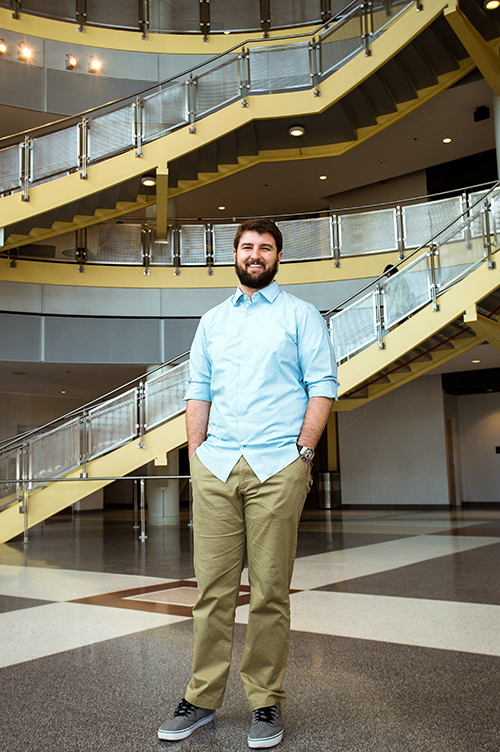Garrett Wessler Awarded NSF Graduate Research Fellowship
Garrett Wessler, a University of Maryland (UMD) senior undergraduate student, has received a National Science Foundation (NSF) Graduate Research Fellowship for his plans to further research emerging materials for solar cells. Wessler is one of 2,000 award recipients, chosen from nearly 17,000 applications, for the 2016 competition. The fellowship recognizes his work in research as an undergraduate with photonic materials in the Leite Lab (MSE and IREAP), as well as his contributions to promoting science more broadly. The fellowship provides a three-year annual stipend of $34,000, along with a $12,000 cost of education allowance for tuition and fees. Wessler, who is to graduate in May from UMD with a Bachelor of Science degree, has accepted a Ph.D. position at Duke University. Wessler started working under the guidance of Marina Leite, assistant professor of materials science and engineering at UMD, in the summer of 2015. Since then, he has also received an ASPIRE fellowship and the Department of Materials Science Student Research award in 2016. In the Leite Lab, Wessler is fabricating and measuring the optical properties of metal-alloyed nanostructures for energy harvesting applications. In collaboration with Ph.D. student Chen Gong, the team is investigating how the alloying of coinage metals (gold, silver, and copper) can be used to engineer light-matter interactions at the nanoscale. Leite commended Wessler for his achievements toward the two main criteria for NSF awards: intellectual merit of the research and the impact of one's work as a scientist. "Garrett is an excellent student from our program who combines key characteristics for becoming a very successful graduate student. While working in my research group, he substantially contributed to our project on plasmonics, presented his scientific findings at the American Physical Society major meeting, and has been truly engaged in promoting STEM to a broad audience," noted Leite. In particular, Wessler spent three weeks in Ecuador in the January 2014, teaching underprivileged students basic science and programming logic. As part of his undergraduate research project, Wessler learned how to fabricate metal alloy nanoparticles by a sputtering deposition method, and uses scanning electron microscopy to characterize them. Together with Gong, he uses ellipsometry and near-field optical microscopy to probe the nanostructures optical response at the macro and nanoscale by measuring how much light these unit blocks can transmit and or reflect/scatter. NSF is focused on science's contribution to society, and Wessler has worked toward that purpose with his teaching in Ecuador, as well as teaching a course for first-semester undergraduate students at UMD who are exploring whether to pursue science as a career. In an Ecuadorean village, he demonstrated programming with robotics, and at UMD, he introduced other students to the concepts and practices surrounding being a scientist on a college campus. As for his work in science, Wessler said he knew he wanted to pursue graduate school after participating in NSF's Research Experiences for Undergraduates (REU) program, during which he worked in a university research lab for 10 weeks between his sophomore and junior years. Research is "a challenge that never really stops. Challenge has always been my motivation," Wessler said. "I want to figure out how things work" by understanding "the fundamental physics and chemistry behind how some of these processes come about," he added. Further, when asked about how his research experiences at UMD helped him achieve his next-step goals, Wessler enthusiastically replied, "While working in the Leite Lab and the Department of Materials Science and Engineering, I’ve been pushed and motivated everyday to become a better scientist and have gained the necessary skills to take the next step and successfully finish my Ph.D. My involvement in research as an undergraduate has been incredibly rewarding, and I’m excited to start my graduate work.” The A. James Clark School of Engineering at the University of Maryland serves as the catalyst for high-quality research, innovation, and learning, delivering on a promise that all graduates will leave ready to impact the Grand Challenges (energy, environment, security, and human health) of the 21st century. The Clark School is dedicated to leading and transforming the engineering discipline and profession, to accelerating entrepreneurship, and to transforming research and learning activities into new innovations that benefit millions. Visit us online at www.eng.umd.edu and follow us on Twitter @ClarkSchool.
April 11, 2016 Prev Next |


